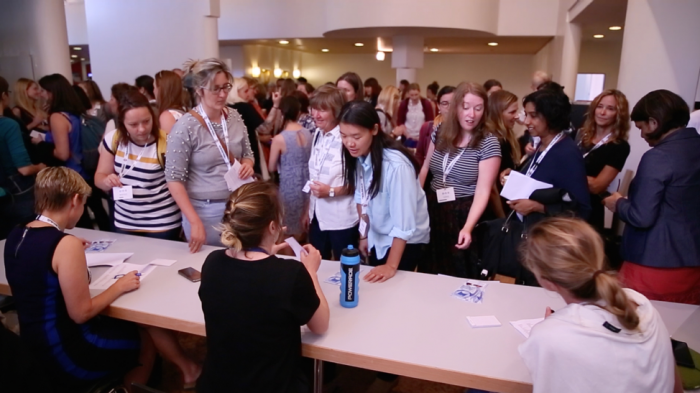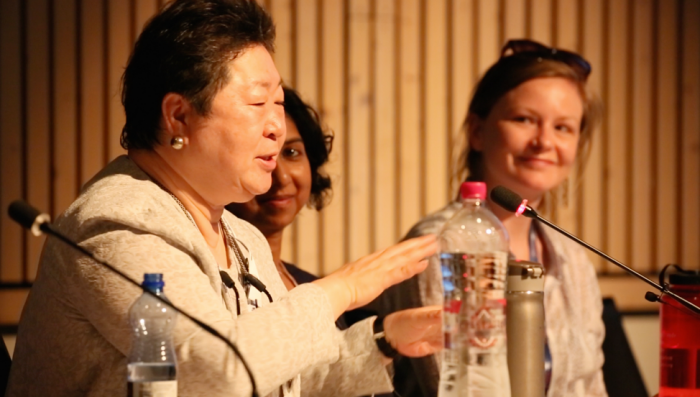By: Sandy Starkweather, Executive Director of the U.S. Arctic Observing Network
An international panel discussion, "From Entering the Field to Taking the Helm, Perspectives of Women in Polar Research," convened during June 2018 in coordination with the POLAR2018 conference held in in Davos, Switzerland. Panelists explored the accomplishments, challenges, quality of work experiences, insights, recommendations, and prospects for women in polar research. The event was organized by Sandy Starkweather (U.S. National Oceanic and Atmospheric Administration), Renuka Badhe (European Polar Board), Sara Bowden (Interagency Arctic Research Policy Committee), and Allen Pope (International Arctic Science Committee).

More than 300 participants representing 32 countries engaged in a vibrant, interactive dialog with the panelists: Susan Barr, International Arctic Science Committee (IASC); HongKum Lee, Korean Polar Research Institute (KOPRI); Chandy Nath, Scientific Committee on Antarctic Research (SCAR); Morgan Seag, Cambridge University; and Colleen Strawhacker, National Snow & Ice Data Center (NSIDC). The discussion was initiated with interview questions formulated by the event moderator Hannah Hoag, independent journalist. An estimated half of all participants were early career scientist; more than 200 participants agreed to be contacted related to a community culture survey (See recommendations).

The five panelists contributed with insight and humor into their feelings of accomplishment, their perceptions of the challenges of engaging in polar research as women, and their joy in and deep appreciation for this type of work. Audience questions honed in on and amplified those sentiments of the panelists focused on barriers and challenges. Multiple audience comments focused on the low numbers of men present in the audience, who accounted for about 5% of the participants.
The event generated a strong response across social media platforms, where hundreds participated in the virtual conversation following the hashtag #PolarWomen2018, eventually reaching a Twitter audience of more than 800,000. The additional perspectives of women featured on the Women in Polar Science Instagram feed (@polarwomen)—40 profiles and growing—further enriches our understanding of the plurality of experiences, potentials, and aspirations of a generation of women poised to impact the world.
Some specific recommendations that the event has generated include:
- Future polar "Diversity and Inclusion" efforts should explore formats that will inspire more balanced participation;
- Continue to develop social media platforms and encourage more Arctic engagement in the Women in Polar Science network (a well-established group, founded by Antarctic scientists);
- Explore the role that a community climate survey could play;
- Consider ways to better integrate inclusivity dialogues into polar meeting programs, encouraging all attendees to participate, and to develop and enforce codes of conduct for polar organizations; and
- Support and encourage efforts like the Forum of Arctic Research Operators and the Council of Managers of National Antarctic Programs to play a role in preventing and responding to sexual harassment in polar field settings.
Event organizers recognize that the innovations required for the next generation of polar research questions surpass the bounds of the physical, chemical, or biological sciences alone. Future challenges will require systems thinking, inclusive collaboration, and the dismantling of socially enmeshed barriers to progress. Improving awareness and equity within our own community is an excellent way to prepare a generation of scientists to meet the challenges posed by rapid ecological change, the complexities of the much-needed interdisciplinary work, and the paradigmatic shift towards knowledge co-production.
